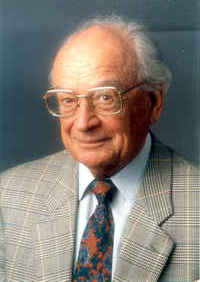Hanscarl Leuner

Hanscarl Leuner (1919–1996) was a German psychiatrist and psychotherapist, best known for his work in the field of psychotherapy, particularly in the development of Guided Affective Imagery (GAI), also known as Katathym-imaginative Psychotherapy (KIP). His contributions to the field of psychotherapy have been influential in the development of therapeutic techniques that focus on the use of imagery and fantasy for emotional healing and personal growth.
Biography[edit]
Hanscarl Leuner was born in 1919. He pursued his medical studies with a focus on psychiatry and later became a prominent figure in the field of psychotherapy. Throughout his career, Leuner was deeply interested in the therapeutic potential of images and fantasies, which led him to develop Guided Affective Imagery, a method that encourages patients to explore their inner worlds through guided daydreams to facilitate psychological healing.
Guided Affective Imagery (GAI)[edit]
Guided Affective Imagery is a psychotherapeutic technique that involves the use of structured daydreams to help individuals explore their subconscious and emotional conflicts. The method is based on the premise that imagery can serve as a bridge to the unconscious mind, allowing for the expression and processing of buried emotions and conflicts. Leuner's work in this area was pioneering, as he developed a structured approach to using imagery in therapy, which included specific imagery exercises tailored to the needs of the individual.
Impact and Legacy[edit]
Leuner's development of Guided Affective Imagery has had a lasting impact on the field of psychotherapy. His method has been integrated into various therapeutic approaches and is used by psychotherapists worldwide to help individuals access and work through emotional issues. Leuner's work has also contributed to the broader understanding of the role of imagery and fantasy in psychological healing and personal development.
Selected Works[edit]
Throughout his career, Hanscarl Leuner published numerous articles and books on the subject of Guided Affective Imagery and its applications in psychotherapy. His writings have been influential in spreading the knowledge and understanding of this therapeutic technique.
Conclusion[edit]
Hanscarl Leuner's contributions to psychotherapy, particularly through his development of Guided Affective Imagery, have left a significant mark on the field. His work has helped to expand the tools available to psychotherapists and has provided a deeper understanding of the therapeutic potential of imagery and fantasy.
Ad. Transform your life with W8MD's Budget GLP-1 injections from $49.99


W8MD offers a medical weight loss program to lose weight in Philadelphia. Our physician-supervised medical weight loss provides:
- Weight loss injections in NYC (generic and brand names):
- Zepbound / Mounjaro, Wegovy / Ozempic, Saxenda
- Most insurances accepted or discounted self-pay rates. We will obtain insurance prior authorizations if needed.
- Generic GLP1 weight loss injections from $49.99 for the starting dose of Semaglutide and $65.00 for Tirzepatide.
- Also offer prescription weight loss medications including Phentermine, Qsymia, Diethylpropion, Contrave etc.
NYC weight loss doctor appointmentsNYC weight loss doctor appointments
Start your NYC weight loss journey today at our NYC medical weight loss and Philadelphia medical weight loss clinics.
- Call 718-946-5500 to lose weight in NYC or for medical weight loss in Philadelphia 215-676-2334.
- Tags:NYC medical weight loss, Philadelphia lose weight Zepbound NYC, Budget GLP1 weight loss injections, Wegovy Philadelphia, Wegovy NYC, Philadelphia medical weight loss, Brookly weight loss and Wegovy NYC
|
WikiMD's Wellness Encyclopedia |
| Let Food Be Thy Medicine Medicine Thy Food - Hippocrates |
Medical Disclaimer: WikiMD is not a substitute for professional medical advice. The information on WikiMD is provided as an information resource only, may be incorrect, outdated or misleading, and is not to be used or relied on for any diagnostic or treatment purposes. Please consult your health care provider before making any healthcare decisions or for guidance about a specific medical condition. WikiMD expressly disclaims responsibility, and shall have no liability, for any damages, loss, injury, or liability whatsoever suffered as a result of your reliance on the information contained in this site. By visiting this site you agree to the foregoing terms and conditions, which may from time to time be changed or supplemented by WikiMD. If you do not agree to the foregoing terms and conditions, you should not enter or use this site. See full disclaimer.
Credits:Most images are courtesy of Wikimedia commons, and templates, categories Wikipedia, licensed under CC BY SA or similar.
Translate this page: - East Asian
中文,
日本,
한국어,
South Asian
हिन्दी,
தமிழ்,
తెలుగు,
Urdu,
ಕನ್ನಡ,
Southeast Asian
Indonesian,
Vietnamese,
Thai,
မြန်မာဘာသာ,
বাংলা
European
español,
Deutsch,
français,
Greek,
português do Brasil,
polski,
română,
русский,
Nederlands,
norsk,
svenska,
suomi,
Italian
Middle Eastern & African
عربى,
Turkish,
Persian,
Hebrew,
Afrikaans,
isiZulu,
Kiswahili,
Other
Bulgarian,
Hungarian,
Czech,
Swedish,
മലയാളം,
मराठी,
ਪੰਜਾਬੀ,
ગુજરાતી,
Portuguese,
Ukrainian
